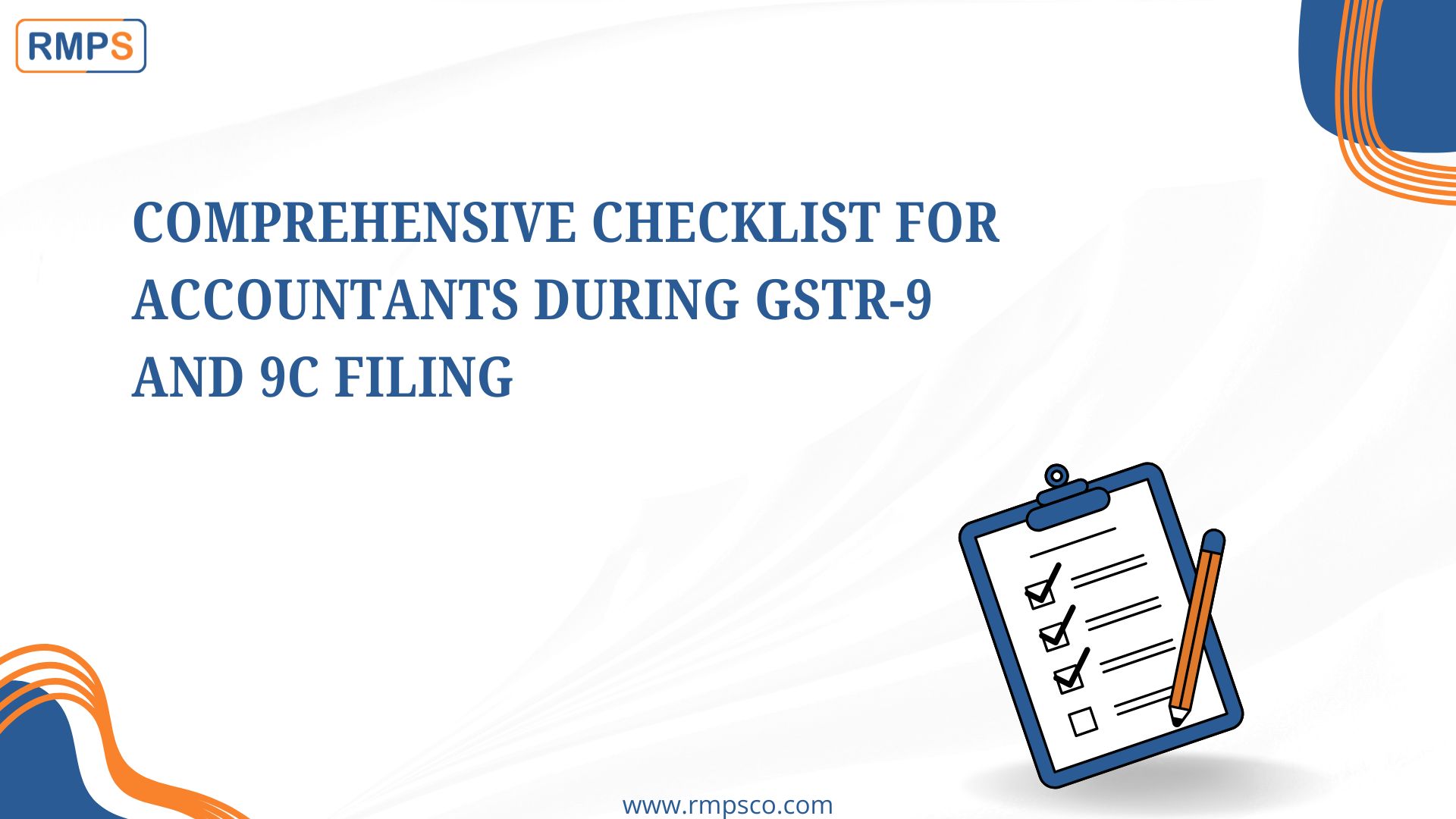
As the financial year concludes, the responsibility of ensuring accurate GST compliance intensifies. Filing the GST annual return (GSTR-9) and reconciliation statement (GSTR-9C) are crucial for maintaining transparency and avoiding penalties. This blog provides a comprehensive checklist for accountants to ensure seamless GST compliance, especially when filing GSTR-9 and GSTR-9C.
Understanding GSTR-9 and GSTR-9C
Before diving into the checklist, it’s essential to understand the purpose of these forms:
- GSTR-9: This is the annual return summarizing the details of outward supplies, inward supplies, ITC claimed, and taxes paid during the year.
- GSTR-9C: This is a reconciliation statement between the annual return (GSTR-9) and the audited financial statements.
The GST Compliance Checklist for Accountants
1. Verify GST Registration Details
- Ensure that the GST registration is active and valid.
- Check for any changes or updates in registration details, such as address, contact information, or authorized signatories.
2. Review Periodic Returns (GSTR-1 and GSTR-3B)
- GSTR-1: Cross-check that all outward supplies are reported accurately. Verify details such as invoice numbers, taxable values, GST rates, and HSN/SAC codes.
- GSTR-3B: Ensure ITC claims, tax liabilities, and tax payments align with GSTR-1. Identify any mismatches or discrepancies.
3. Reconcile Input Tax Credit (ITC)
- Match ITC claims in the books with GSTR-2A/2B available on the GST portal.
- Reverse any ineligible ITC, such as ITC on personal expenses or blocked credits under GST law.
- Ensure compliance with time limits for claiming ITC.
4. Tax Payment Validation
- Confirm that all tax payments are made within the prescribed timelines.
- Cross-check challans for accuracy in payment details, such as GSTIN, payment type, and tax period.
5. E-Way Bill Compliance
- Review whether e-way bills are generated for applicable transactions as per GST rules.
- Retain a record of all e-way bills to facilitate future audits or queries.
6. Perform Reconciliation Tasks
- Reconcile turnover reported in GST returns with the audited financial statements.
- Match ITC and tax liabilities as per GST returns with the ledger accounts.
- Verify that HSN/SAC codes used in returns align with invoices.
7. Maintain Records as per GST Law
- Organize and maintain records of invoices, credit/debit notes, purchase orders, and payment receipts for at least six years.
- Ensure easy accessibility of these records for audits and inspections.
8. Stay Updated with GST Amendments
- Regularly monitor GST notifications, circulars, and amendments.
- Implement necessary changes in accounting software or processes to comply with the latest rules.
9. Audit Preparation
- Prepare a reconciliation statement to identify and rectify discrepancies.
- Collect all supporting documents, including bank statements, agreements, and ledger extracts, for verification.
- Be ready to explain any adjustments made during the filing process.
10. Address GST Notices Promptly
- Respond to GST notices or queries without delay.
- Maintain a log of all communications with tax authorities for future reference.
11. Miscellaneous Tasks
- File nil returns, if applicable, to avoid penalties.
- Conduct periodic reviews of GST compliance status, preferably on a monthly or quarterly basis.
Common Challenges and How to Overcome Them
1.Mismatch in Reconciliations:
Solution: Perform regular reconciliations between books of accounts and GST returns to avoid last-minute mismatches.
2.Delayed Updates on GST Notifications:
Solution: Subscribe to updates from reliable sources, including the GST portal, to stay informed about changes.
3.Inaccurate ITC Claims:
Solution: Use robust accounting software to automate ITC matching and reduce manual errors.
Conclusion: Ensuring GST Compliance Made Easy
GST compliance is a critical aspect of financial management for businesses. By following this comprehensive checklist, accountants can ensure that GSTR-9 and GSTR-9C filings are accurate, compliant, and hassle-free. Regular reconciliations, timely tax payments, and diligent record-keeping are the cornerstones of successful GST compliance.
LinkedIn Link : RMPS Profile
This article is only a knowledge-sharing initiative and is based on the Relevant Provisions as applicable and as per the information existing at the time of the preparation. In no event, RMPS & Co. or the Author or any other persons be liable for any direct and indirect result from this Article or any inadvertent omission of the provisions, update, etc if any.
Published on: December 5, 2024
